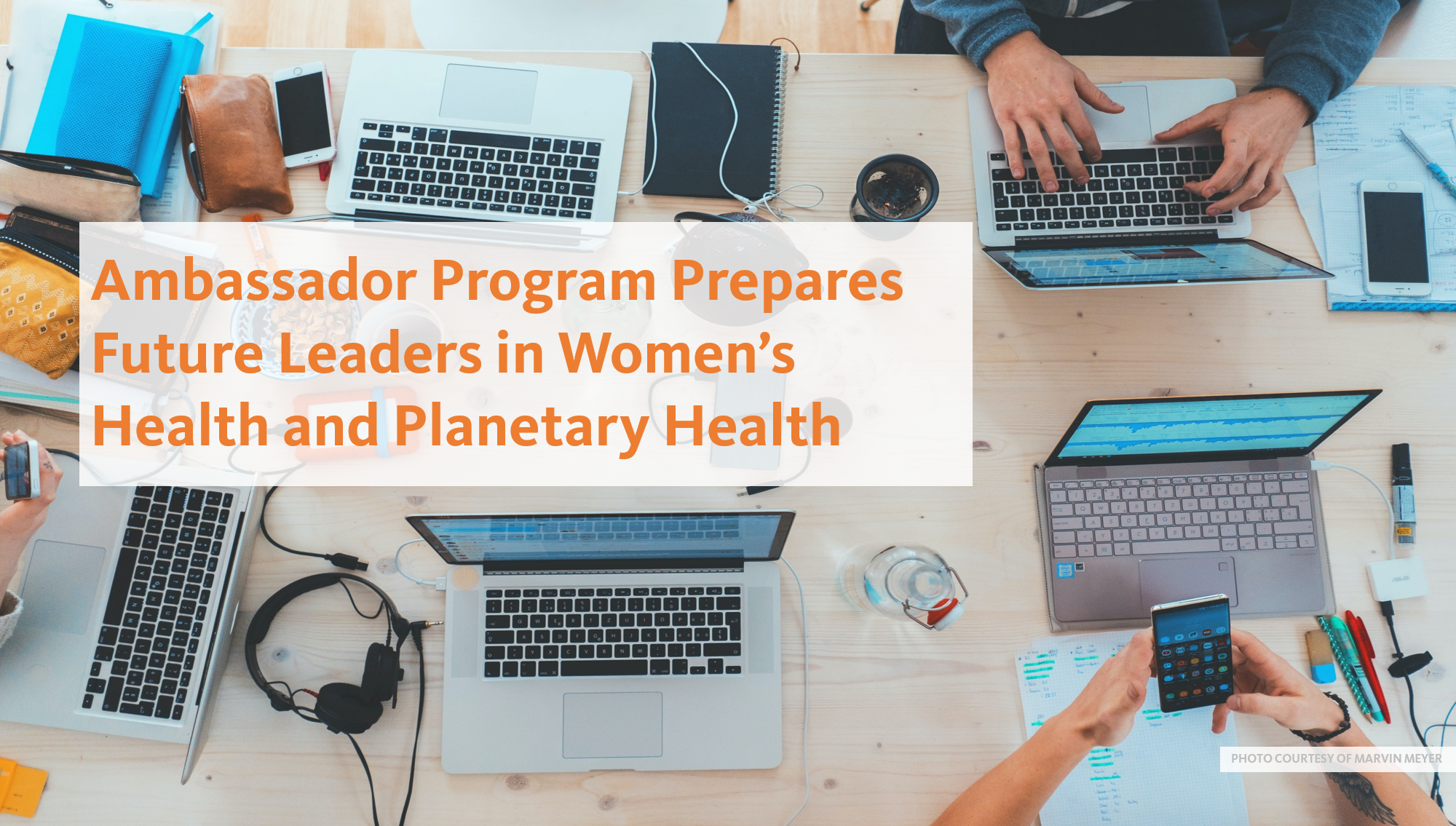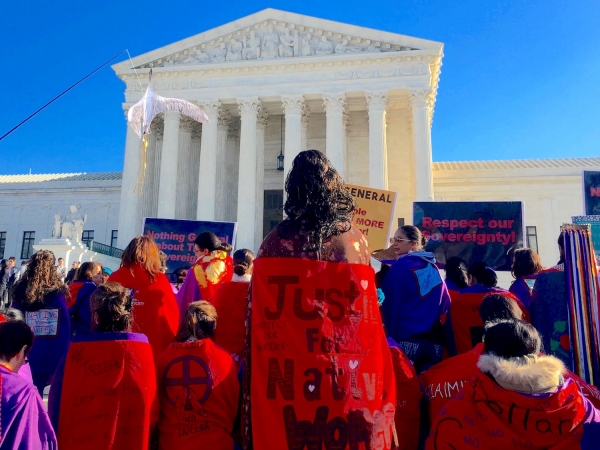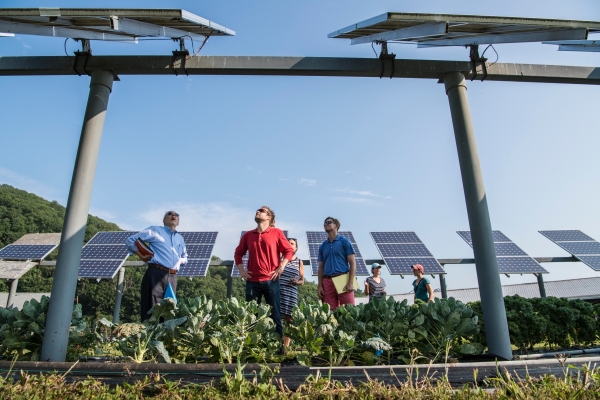
Seeing a problematic approach to global health is what drew Catthi Ly to the field. When she started a summer program as a high school student with a mission to provide health services in Vietnam, she thought she’d be making a difference. She quickly became disillusioned with how patients were treated.
“It just felt it was kind of a dehumanizing experience for them because we weren't really looking at them as people,” she said. “We were more looking at them with like this medical gaze where we weren't engaging with their story or what their lives are like, we were just getting a few basic measures, such as high blood pressure, glucose level, and cholesterol, and then trying to put a Band-Aid on the whole situation.”

As a premedical student at UC Irvine, she found a program to help her reach her goals of melding anthropology and medicine to best serve global communities: the UCGHI Student Ambassadors Program.
The program provides a leadership opportunity for students at all educational levels across the 10 UC campuses. Ambassadors select between two areas of focus linked to the two centers of expertise within UCGHI: Women's Health, Gender, and Empowerment (WHGE) Center of Expertise and Planetary Health (PH) Center of Expertise. Students apply for the program and their selected track. Applicants must demonstrate strong communication skills, leadership, initiative, and interest in WHGE or planetary health topics. The program lasts for an academic year. In the 2019 to 2020 academic year, 40 students.
Students in the WHGE track focus on issues affecting women’s and girls’ health, including promoting healthy gender norms and preventing campus-based sexual assault and dating violence. Those in the planetary health track study how the health of the planet and the animals and people who live on it are intertwined. Students work to advance the issues in their chosen track through activities on their own campuses and through presentations given at Global Health Day at the end of the year. Students also learn from experts across the 10-campus system through regularly scheduled presentations.
Ly chose the WHGE track. She said her start at college coincided with the start of the #MeToo movement. Her life before college had been in “a really sheltered environment,” she said. “Hearing those news stories for the first time, that made me learn more about what it's like to be a woman in the workplace and how dangerous it can be.” Ly also respected the work of women she saw on another trip to Vietnam. The women, Catholic nuns, help children with cerebral palsy and neurological developmental disorders. Ly was surprised and impressed by how resourceful and successful the women are in establishing and operating a cerebral palsy center without institutional support.
“I thought it was really inspiring to see women doing that kind of work,” she said.
Madeleine Tremblay, a rising junior at UC Santa Barbara, also chose the WHGE track. A double major in global studies and Chinese, Tremblay learned about the program through a presentation at UC Santa Barbara on global health by Dr. Melissa Smith, a member of UCGHI’s board and director of Health Equity Initiatives at UC Santa Barbara.
“It just sounded like an amazing opportunity to connect with professionals and then connect with other students like me who are really interested in this,” she said.
As part of her work to raise awareness of WHGE issues at UC Santa Barbara, she joined with leaders of clubs across campus and another student ambassador to design sexual assault prevention strategies to be incorporated in orientation provided to incoming students.
“We're trying to work on the sexual assault section and on prevention tools and educating about sexual assault and consent,” she said.
A key part of the Ambassadors Program is that students join with others from different education levels, disciplines, and campuses to create a presentation on a global health issue for Global Health Day. This typically in-person event for students across the various campuses was made virtual this year due to the COVID-19 pandemic.
Tremblay joined a premedical student from UC Berkeley and a student from UC Merced in researching the epidemic of missing and murdered indigenous women and girls in North America. “It was a topic that I knew a little bit about, but this really gave me an opportunity to dive more into it,” she said.

These women experience very high rates of violence and sexual violence in particular compared with women from other racial groups, she said. The team examined historical and institutional reasons behind the violence, including that many of the crimes that happen on tribal land are perpetrated by people who aren’t tribal members and therefore aren’t subject to a tribe’s laws, the hyper-sexualization of indigenous women, and the misperception that Native Americans live solely on reservations, she said.
Tremblay feels the program has given her a good grounding for her longer-term goals. She’ searching for dual master’s in public health and law school programs with the eventual goal of focusing on mental health issues globally.
Nilpa Shah, who is pursuing a master of public health degree in community health sciences at UC Los Angeles, chose the planetary health track. “For me, planetary health stood for community health, for trying to empower the communities that I work in, to improve the inequities and reduce the disparities that we see in our communities,” she said.
Shah learned of the Ambassadors Program through a past year’s ambassador who spoke highly of it. Shah was particularly drawn to the multi-campus and multidisciplinary aspects of the program.
For its end of the year presentation, Shah’s team, which included students from UC Davis and UC Riverside, covered the health impacts of urbanization. She focused on the physical health of urbanizing communities and found the mental health effects studied by a team member fascinating. That student found an increase in anxiety and stress in urbanized communities compared with rural ones, Shah said. “That was the first time I’d thought of the mental health issues surrounding urbanization,” she said.
Shah also appreciated the variety of topics covered in other teams’ presentations and how discussions throughout the year cut across many fields of global health. One presentation focused on how COVID-19 is affecting planetary health and how planetary health affects the spread of infectious diseases, she said. A discussion she found eye-opening covered the environmental effects of the fashion industry and the need for sustainable materials for clothing.
“The Ambassadors Program was amazing because I was able to see a lot of links between different community health issues that I did not notice before,” she said.
Shah, who was born in India and moved to the United States as a high school student, hopes to use what she learned through the program and her degree to empower communities to become health leaders.
“Through my work, I hope to reduce healthcare inequity and improve individual and population health outcomes,” she said.
Geoffrey Koch, a second-year PhD student at UC Davis studying soils and biogeochemistry, is also in the planetary health track. Koch’s interest is in strategies to mitigate climate change. The planet faces monumental problems caused by climate change, but researchers are starting to have the tools to solve some of those problems, he said. People who can clearly communicate scientific solutions to policymakers and the public are needed for those tools to actually be used, and the Ambassadors Program offered an avenue to help him learn how to become one of those people, he said.
“I'm trying to learn how to be a better ambassador of knowledge through scientific communication and being engaged in those conversations that I think are happening more and more,” he said. The program “was an opportunity to engage with people who are interested in talking about these things and share some of my experience, knowledge, and maybe even some of my own expertise,” he said.
Koch’s presentation team included students from UC Berkeley and UC Riverside. The team discussed COVID-19’s effect on climate change by reducing emissions through changes in human behavior. Team members considered what a new normal might look like with changes to business and to travel and which of these changes might become permanent, as well as the economic costs of those changes.

“It’s a bit of an early case study looking at what's happening and how everything has a downstream effect,” he said.
Koch found the professional development aspects of the program, including presentations from a variety of UCGHI experts, helpful. “For both undergrads and grad students, it's an uncertain world,” he said. “We're trying to learn what directions we could go in, how we can be greatest use to the world, how we can develop ourselves professionally and also be agents of change.”
For his long-term goals, Koch is considered pursuing an academic appointment or becoming a consultant at a global health or farmer-supporting organization. Currently, Koch is working on project with California’s Healthy Soils Initiative, a statewide program to encourage farming practices that improve soil health and potentially sequester carbon.
“If we can figure out ways to manage soil to increase carbon sequestration just a little bit, then the potential to mitigate climate change’s effects is really significant,” he said.
